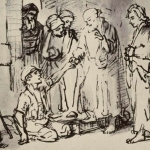Sermon February 23/ Vicar James Preus/ Prince of Peace Lutheran Regina, SK/ Matthew 5:38-48/ God Loved Us When We Were His Enemies

38 “You have heard that it was said, ‘An eye for an eye and a tooth for a tooth.’ 39 But I say to you, do not resist the one who is evil. But if anyone slaps you on the right cheek, turn to him the other also. 40 And if anyone would sue you and take your tunic, let him have your cloak as well. 41 And if anyone forces you to go one mile, go with him two miles. 42 Give to the one who begs from you, and do not refuse the one who would borrow from you.
43 “You have heard that it was said, ‘You shall love your neighbor and hate your enemy.’ 44 But I say to you, Love your enemies and pray for those who persecute you, 45 so that you may be sons of your Father who is in heaven. For he makes his sun rise on the evil and on the good, and sends rain on the just and on the unjust. 46 For if you love those who love you, what reward do you have? Do not even the tax collectors do the same? 47 And if you greet only your brothers, what more are you doing than others? Do not even the Gentiles do the same? 48 You therefore must be perfect, as your heavenly Father is perfect.
Grace, peace, and mercy from God our Father and from Christ Jesus our Lord: Dear brothers and sisters in Christ: Jesus went from region to region healing those who were crippled, those with leprosy, the sick, and the demon-possessed. As news traveled that Jesus could heal people, more and more people came from all around Judea with their sick for Jesus to heal. Great crowds began to follow Jesus, looking to him for spiritual guidance. Jesus, seeing the great crowds, went up onto a mountain, so that he could be seen and heard across the crowd. Then Jesus began to teach them. For the past few Sundays the Gospel lesson has been a portion of Jesus’ Sermon on the Mount.
In today’s appointed reading, Jesus ruffles some feathers. With his words Jesus claims authority. He distinguishes himself from the teachers of that day. Yet these are hard sayings of Jesus. First Jesus says, “You have heard that it was said, ‘An eye for an eye and a tooth for a tooth.’ But I say to you, Do not resist the one who is evil…” “But wait!” you might say, “An eye for an eye and a tooth for a tooth.” Didn’t Moses, the prophet of God write that?[1] Is Jesus contradicting God’s Word? No, Jesus is not contradicting God’s Word, because Jesus is the source of God’s Word. Jesus cannot contradict himself.
Rather, Jesus explains God’s Word. God gave Moses the command ‘an eye for an eye and a tooth for a tooth’ so that the nation of Israel would carry out justice rightly. Moses’ command is for the government. Yet the teachers of the day applied this command to individuals, saying that individuals should seek revenge. But this is a perversion of justice! God says: “Vengeance is Mine, I will repay!”[2] God does not give us the authority to seek vengeance for ourselves. God does give government the authority and the obligation to carry out justice.
Instead of seeking revenge, Jesus directs his Christians to not resist the one who is evil and to turn the other cheek to one who strikes you. Now, Jesus is not saying that the police officers and judges should not arrest and punish criminals. Jesus is not speaking to the secular government.
Here Jesus addresses his Christians. Jesus tells his Christians not to fight back against insults and not to defend their own glory.
Yet Jesus is not saying that Christians cannot seek justice. Christians can and should report wrong doing to the proper authorities. They should call the police if they are robbed. However, when no legitimate authorities will respond to the individual’s pleas for justice, Jesus forbids the Christian to take the law into his own hands.
Jesus says, “If anyone would sue you and take your tunic, let him have your cloak as well.” Here, Jesus tells us to accept persecution. Jesus also does not mean that a Christian should give everything he has to anyone and everyone and let his wife and children starve and freeze to death! Rather, Jesus says, “Give to the one who begs.”
 The confusion in this lesson of Jesus comes from the confusion in vocation. A man can be a judge and a Christian. As a judge he must punish criminals, even to command force. As a Christian, he is forbidden to use force against his neighbor. A woman can be a Christian and a mother. As a Christian, she ought to take any insult, give to the one who begs, and accept abuse. But as a mother, she must guarantee her children’s safety, refuse to give away their food and clothing, and even use force to defend them from harm.
The confusion in this lesson of Jesus comes from the confusion in vocation. A man can be a judge and a Christian. As a judge he must punish criminals, even to command force. As a Christian, he is forbidden to use force against his neighbor. A woman can be a Christian and a mother. As a Christian, she ought to take any insult, give to the one who begs, and accept abuse. But as a mother, she must guarantee her children’s safety, refuse to give away their food and clothing, and even use force to defend them from harm.
So we should distinguish the secular government and secular vocations from the call to be a Christian.
Yet even with this distinction, it is difficult in our lives to determine what the appropriate response is in various situations. It is good for us to strive to fulfill our vocation in life, whether it is parent, employee, or civil servant. Yet, as individual Christians, we should follow the example of Jesus and serve one another. As the Apostle Paul writes: “Do nothing from selfish ambition or conceit, but in humility count others more significant than yourselves.”[3]
Jesus’ next statement is even more difficult to accept, yet here Jesus corrects an even greater error: “You have heard that it was said, ‘You shall love your neighbor and hate your enemy.’” God’s Word most certainly requires us to love our neighbor, but nowhere in God’s Word does it say that we should hate our enemies. The teachers of the day taught such things to make the Law easier to follow. If people can keep the Law, then they cannot be condemned. It’s too difficult to love one’s enemy. If we are charged to love our enemies… who can keep the law? So the teachers of the day say to love your neighbor, meaning, love your loved ones, but hate your enemies.
What a perverted interpretation of the Law! Who doesn’t love his loved ones? If this is the Law, then even Satan and his demons keep this command.
One might say, “But doesn’t David in the Psalms say, “Do I not hate those who hate you, O Lord? And do I not loathe those who rise up against you? I hate them with complete hatred; I count them my enemies.”[4] This is true, yet here David speaks against false teaching. Again a distinction must be made. As far as these people teach falsely about God and lead others to hell, David condemns them according to God’s Word and according to his vocation as the Lord’s Annointed. This does not mean that we should count individual Muslims, Hindus, or Atheists our enemies. As far as they teach falsely, we should hate their teaching and pray that God would prevent such teaching from leading people astray. We must love God more than humans. However, if a Muslim, Hindu, or Atheist is in need, God’s Word requires that we help them. Even where Christians are persecuted by Muslims or secular governments, we pray for the end of persecution, but we also pray for the souls of the persecutors.
 This again remains a difficult task even with an explanation. I remember in May of 2011 when the news that Osama bin Laden was killed by American special forces. My immediate response was great jubilation. I first learned of Osama bin Laden in the year 2000 when he was credited for the bombing of the USS Cole, which killed 17 American soldiers. I was taught in school that he was America’s enemy. A year later bin Laden was credited for the 9/11 attacks that killed nearly 3,000 civilians. Many nations went to war after that. For ten years I, along with many people around the world waited to hear the news of the capture or kill of this mass murderer. And then it happened! Yet as I rejoiced with my roommate at the death of my enemy, I remembered these words of Jesus. “Love your enemies.” While it was good for justice to be served, this moment reminded me of the extremity of Jesus’ command to love.
This again remains a difficult task even with an explanation. I remember in May of 2011 when the news that Osama bin Laden was killed by American special forces. My immediate response was great jubilation. I first learned of Osama bin Laden in the year 2000 when he was credited for the bombing of the USS Cole, which killed 17 American soldiers. I was taught in school that he was America’s enemy. A year later bin Laden was credited for the 9/11 attacks that killed nearly 3,000 civilians. Many nations went to war after that. For ten years I, along with many people around the world waited to hear the news of the capture or kill of this mass murderer. And then it happened! Yet as I rejoiced with my roommate at the death of my enemy, I remembered these words of Jesus. “Love your enemies.” While it was good for justice to be served, this moment reminded me of the extremity of Jesus’ command to love.
Jesus speaks very emphatically on this topic. He imperatively commands: “Love your enemies! Pray for those who persecute you!” And if his tone is not urgent enough, Jesus adds: “so that you may be sons of your Father who is in heaven.”
Wow! What a statement! Love your enemies so that you can be sons of your Father in heaven! How does loving your enemy make you a son of God the Father?
First we must clarify. And this is important. There is nothing that we do that makes us children of God. God makes us his children by grace. He does this through baptism and by calling us into faith. Through repenting of our old self and trusting in Jesus, we become children of God.
However, when one becomes a child of God, he doesn’t just leave it at that. Many people think: “Yes, I know. Jesus saved me. Now let me live the life I want, neglect God’s Word, ignore my Christian vocation, and live as if I never knew Jesus.” But such a way of life is not to live as a child of God. A child imitates his parents. A child of God imitates God.
So how do we imitate our Father in heaven by loving our enemy? We were once enemies of God. In our sin we could do nothing but offend God. Jesus says: “the diseased tree bears bad fruit.” We were conceived and born spiritually diseased. We constantly sinned against God. Now here is the main point! God did not hate us. Though we were his enemies, he did not destroy us. Instead, God sent his Son to save us. Jesus placed himself under the very commands that he sets before us today. Jesus did not resist the evil one. Instead, he let violent men abuse him both with fists and insults. He permitted Roman soldiers to strip him of both his tunic and his cloak. When he was forced, he did not just walk one mile or even two. Jesus walked all the way to Golgotha, where he was crucified to death. And to all those who beg for forgiveness, Jesus freely gives. And Jesus prayed for those who crucified him, even as he hung on the cross!
Jesus charges us to love our enemies, because when we were still enemies with God, God loved us! God sent Jesus to mend our broken relationship. Jesus purchased our adoption as children of God by pouring out his holy innocent blood. God the Father is our heavenly Father, because he made us his children through Jesus. We did not make him our heavenly Father, any more than a baby makes herself her parents’ child.
And as his children, God charges us to imitate him. Jesus teaches his adopted brothers and sisters how to live in their new identity. That is what Jesus is doing in today’s lesson! Jesus teaches us how to be children of God the Father. We imitate our Father in heaven by imitating our brother and savior Jesus.
Jesus concludes this section: “You therefore must be perfect, as your heavenly Father is perfect.” This final statement strikes fear in the hearts of many. “But I’m not perfect… I don’t love my enemies. I fight for my own honor! I hate not only those who hate me, but I even begrudge my own loved ones at times. I seek vengeance for my own sake. I don’t love my neighbor as myself. I don’t give freely, but I protect my assets even if I have more than I need. If I must be perfect as my heavenly Father is perfect, all I can say is, ‘I have failed.’”
Yet despite our failures, we are nevertheless God’s children by grace through faith. Through faith we trust and we receive forgiveness from Jesus. Jesus exchanges his holiness for our sins. Jesus stood before God’s judgment as God’s enemy, so that we could stand before God’s judgment as righteous children. In Jesus’ death all our sins were washed away. When the Father raised Jesus from the dead, God the Father concurred that Jesus washed away our sins.
Washed in Jesus blood, we stand before God’s throne perfect, just as Jesus dwells with God the Father in perfect holiness and righteousness.
However, when Jesus says that we must be perfect, he is not speaking only of the perfectness we receive as a gift through Jesus. Jesus tells us that God intends us to be mature Christians. What is a mature Christian? A mature Christian is one who grows spiritually in faith and good works. Good works do not save us. Even an infant in the faith is saved. However, as children of God, we always seek to grow. How do we become mature Christians? We become mature Christians by confessing our Christian faith, even under persecution. We become mature Christians by studying God’s Word, listening to his teaching and preaching. We do not seek to defend our honor or our bodies by denying our faith, but we confess Jesus even under ridicule and physical harm. We give generously, just as God gives generously to us and forgives our sins. We love both our neighbors and our enemies, those who hurt us. As God shines the sun and rains life giving water on both the good and the evil, we let our love shine on both our loved ones and our enemies and we work to serve both those who love us and those who hate us. When we see those who hate God, we pray for them, because we were once enemies of God as well.
It is God’s will that his children strive to imitate him. Those who are content in their sins and do not desire to grow into mature Christians may even lose their faith.
Do not let the command to be perfect frighten you. You are already perfect by grace through faith in Jesus. We are not enemies of God anymore! However, let our adoption as children of God motive us to learn Jesus’ pure teaching and let Jesus’ pure teaching guide us to live as mature Christians.
 As the great Lutheran hymn states: “Faith clings to Jesus’ cross alone and rests in Him unceasing; and by its fruits true faith is known with love and hope increasing. For faith alone can justify; Works serve our neighbor and supply the proof that faith is living.”[5]
As the great Lutheran hymn states: “Faith clings to Jesus’ cross alone and rests in Him unceasing; and by its fruits true faith is known with love and hope increasing. For faith alone can justify; Works serve our neighbor and supply the proof that faith is living.”[5]
Let us pray:
Let me be Thine forever, my faithful God and Lord, Let me forsake Thee never Nor wander from Thy Word. Lord, do not let me waver, But give me steadfastness, And for such grace forever Thy holy name I’ll bless.[6]
Amen.


